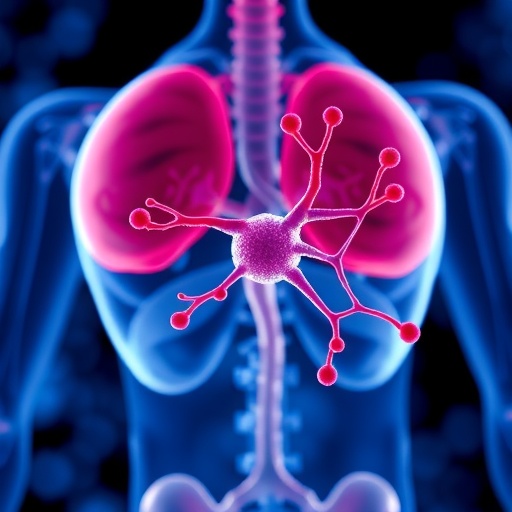In the evolving landscape of metabolic disease treatments, amylin emerges as a noteworthy player. This peptide, co-secreted with insulin from the pancreatic beta cells, has garnered attention for its multifaceted role in glucose metabolism and appetite regulation. The study by Volčanšek et al. takes a profound dive into the functional properties of amylin, elucidating its mechanisms of action and potential therapeutic applications, particularly in the context of diabetes and obesity. The authors argue that while much has been understood about amylin, its full clinical potential remains to be thoroughly unlocked.
Amylin acts on the central nervous system and peripheral tissues to exert its effects. Within the brain, it influences key hypothalamic pathways related to energy balance and satiety, while in peripheral tissues, it plays a role in reducing glucagon secretion and slowing gastric emptying. This dual mechanism promotes a decrease in postprandial glucose levels and helps curb overeating—a contributing factor in obesity. The study signifies that leveraging the amylin pathway could represent a paradigm shift in managing metabolic disorders, primarily due to its physiological interactions.
A striking aspect of amylin’s action is its synergistic relationship with insulin. In states of insulin resistance, often seen in type 2 diabetes, the ability of amylin to regulate glucose levels becomes increasingly critical. The authors highlight how diminished amylin secretion alongside insulin resistance complicates the metabolic landscape. Therefore, exploring amylin-replacement therapies or analogs could provide a complementary approach to insulin therapy, which is often insufficient in combating hyperglycemia in diabetic patients.
Though diabetes treatment options have expanded drastically over the past few decades, challenges remain in addressing the unique metabolic profiles of individuals. Personalized medicine has become a buzzword in healthcare, and amylin could be key to unlocking customized therapies. This is particularly pertinent in populations with varying degrees of insulin sensitivity and obesity. The study speaks to the need for precision strategies that consider the intricate interplay between amylin, insulin, and other neuroendocrine factors that govern metabolism.
The engagement of amylin in appetite regulation presents another layer of complexity. While it possesses the potential to suppress food intake, the subjective experience of hunger and satiety varies greatly among individuals. Understanding the neurobiological mechanisms underlying these sensations can help refine treatment approaches that utilize amylin. Some patients may respond favorably to amylin-based treatments, while others may require a multifaceted approach addressing additional neurohormonal signals that influence eating behavior.
Additionally, the formulation of amylin-based therapies presents technical challenges. Given amylin’s aggregation propensity, which undermines its bioavailability and efficacy, scientists are diligently working on developing stable amylin analogs that maintain physiological function without the drawbacks of its natural form. Such breakthroughs could improve patient compliance with therapies and broaden the scope of amylin application in clinical scenarios, particularly in obesity management.
The implications of incorporating amylin analogs into clinical practice extend beyond glycemic control. The study posits that harnessing amylin’s properties could also mitigate obesity-related co-morbidities such as cardiovascular diseases and fatty liver disease. By targeting fed and fasting states, researchers assert that comprehensive management of metabolic health could be achieved, ultimately improving quality of life for patients.
Despite the growing body of research on amylin, ongoing investigations are still needed to grasp its full clinical potential. Observational studies that explore amylin’s role in various metabolic conditions will be crucial in portraying a more complete picture. Moreover, randomized controlled trials are required to assess the long-term effects and safety profiles of amylin-based therapies in diverse populations, ultimately paving the way for robust guidelines in clinical practice.
In conclusion, the work of Volčanšek et al. illuminates an enticing avenue for addressing the burgeoning diabetes and obesity epidemics through the lens of amylin biology. Their findings suggest that understanding and harnessing this peptide can dramatically alter therapeutic paradigms and patient outcomes. As the scientific community continues to unravel the intricacies of metabolic regulation, amylin stands out as a promising candidate that warrants further exploration in both basic and applied research contexts. The future of diabetes and obesity management may indeed depend on how well we can integrate our understanding of amylin into clinical frameworks to realize its full potential.
Subject of Research: Potential therapeutic applications of amylin in diabetes and obesity management.
Article Title: Amylin: From Mode of Action to Future Clinical Potential in Diabetes and Obesity.
Article References:
Volčanšek, Š., Koceva, A., Jensterle, M. et al. Amylin: From Mode of Action to Future Clinical Potential in Diabetes and Obesity.
Diabetes Ther 16, 1207–1227 (2025). https://doi.org/10.1007/s13300-025-01733-8
Image Credits: AI Generated
DOI: https://doi.org/10.1007/s13300-025-01733-8
Keywords: Amylin, Diabetes, Obesity, Therapies, Metabolism, Insulin, Appetite Regulation, Personalized Medicine, Efficacy, Clinical Practice.




